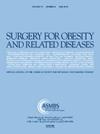代谢减肥手术后的自杀风险:配对队列研究和人群研究的荟萃分析。
IF 3.5
3区 医学
Q1 SURGERY
引用次数: 0
摘要
背景:代谢减肥手术(MBS)仍然是治疗重度肥胖症患者的最佳方法。然而,人们越来越关注代谢性减肥手术后的自杀风险:比较成年肥胖症患者接受或不接受代谢减重手术治疗后的自杀风险:地点:中国大学附属医院:方法:检索PubMed和Embase至2024年4月30日。符合条件的研究为匹配队列研究和基于人群的研究(PROSPERO ID:CRD42024561042)。研究结果采用随机效应模型进行汇总。根据研究类型进行分组分析:共有 3 项匹配队列研究(4 项匹配队列)和 2 项基于人群的研究符合筛选标准,涉及 114,615 名接受 MBS 治疗的成年肥胖症患者(272 人自杀)和 552,642 名未接受手术治疗的患者(622 人自杀)。与未接受 MBS 治疗的患者相比,接受 MBS 治疗的患者自杀风险比 (HR) 为 2.12(95% 置信区间 [CI] 1.54-2.92,P < .01,I2 = 24%),自杀风险比 (RR) 为 2.32(95% 置信区间 [CI] 1.55-3.45,P < .01,I2 = 58%)。在亚组分析中,与基于人群的研究亚组相比,在匹配队列研究亚组中观察到了相对较高的集合HR(2.64 [1.84-3.77] 对 1.67 [1.32-2.12] )和RR(2.98 [2.02-4.41] 对 1.48 [.80-2.75]):就HR和RR而言,接受MBS治疗的成人患者的自杀风险是未接受MBS治疗的成人患者的两倍多。然而,绝对风险较低,因此不建议普遍使用 MBS。本文章由计算机程序翻译,如有差异,请以英文原文为准。
Risk of suicide after metabolic bariatric surgery: a meta-analysis of matched cohort studies and population-based studies
Background
Metabolic bariatric surgery (MBS) remains the optimal treatment for patients with severe obesity. However, concern is growing about the risk of suicide after MBS.
Objectives
To compare the risk of suicide in adult patients with obesity, treated with or without MBS.
Setting
University-affiliated hospital, China.
Methods
PubMed and Embase were searched through April 30, 2024. Eligible studies were matched cohort studies and population-based studies (PROSPERO ID: CRD42024561042). Effects were pooled using a random-effects model. Subgroup analysis was performed based on study type.
Results
A total of 3 matched cohort studies (4 matched cohorts) and 2 population-based studies, involving 114,615 adult patients with obesity treated with MBS (272 suicides) and 552,642 nonsurgery counterparts (622 suicides), met the selection criteria. Patients treated with MBS had a pooled hazard ratio (HR) of suicide of 2.12 (95% confidence interval [CI] 1.54−2.92, P < .01, I2 = 24%) and a pooled risk ratio (RR) of suicide of 2.32 (95% CI 1.55−3.45, P < .01, I2 = 58%) compared with those treated without MBS. In the subgroup analysis, relatively higher pooled HR (2.64 [1.84−3.77] versus 1.67 [1.32−2.12]) and RR (2.98 [2.02−4.41] versus 1.48 [.80−2.75]) were observed in the subgroup of matched cohort studies compared with the subgroup of population-based studies.
Conclusions
Adult patients treated with MBS are at more than double the risk of suicide than those treated without MBS in terms of both HR and RR. However, the absolute risk was low and did not warrant a general discouragement of MBS.
求助全文
通过发布文献求助,成功后即可免费获取论文全文。
去求助
来源期刊
CiteScore
6.70
自引率
12.90%
发文量
570
审稿时长
56 days
期刊介绍:
Surgery for Obesity and Related Diseases (SOARD), The Official Journal of the American Society for Metabolic and Bariatric Surgery (ASMBS) and the Brazilian Society for Bariatric Surgery, is an international journal devoted to the publication of peer-reviewed manuscripts of the highest quality with objective data regarding techniques for the treatment of severe obesity. Articles document the effects of surgically induced weight loss on obesity physiological, psychiatric and social co-morbidities.

 求助内容:
求助内容: 应助结果提醒方式:
应助结果提醒方式:


